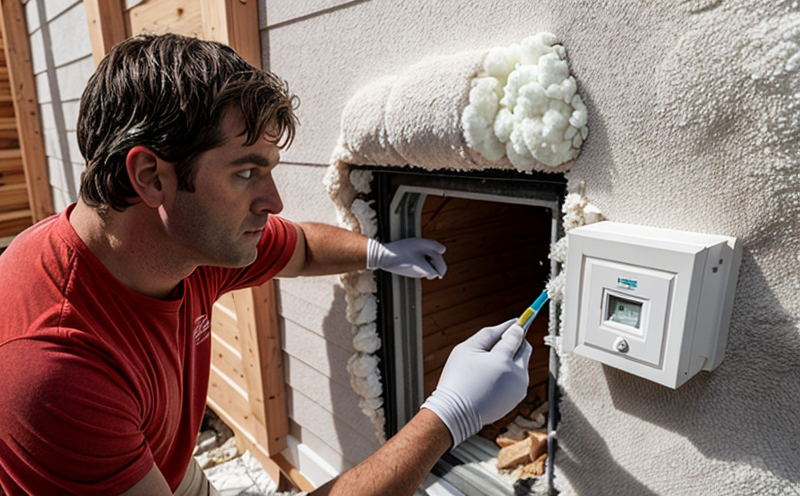EN 13162 Performance of Mineral Wool Insulation
The European Standard EN 13162-2:2017 specifies the procedures for determining the thermal conductivity, apparent density, and mean temperature for mineral wool insulation products. This standard is critical in ensuring that building materials meet stringent performance criteria related to energy efficiency and environmental sustainability.
The testing procedure outlined by this standard ensures accurate measurement of key parameters which are indicative of a material's insulating properties. Properly conducted tests allow manufacturers and users alike to assess the thermal performance of mineral wool insulation products accurately, thereby facilitating informed decision-making in various construction contexts.
Mineral wool insulation is widely used in residential and commercial buildings for its excellent thermal and acoustic insulation capabilities. However, ensuring that these materials perform as expected requires rigorous testing. The EN 13162 standard provides a standardized approach to this task, making it easier for industries to comply with regulatory requirements and industry standards.
The standard applies not only to mineral wool but also to other similar products used in insulation applications within the building sector. By adhering to these guidelines, manufacturers can ensure their products meet international benchmarks, thus enhancing their credibility and market competitiveness.
Testing conducted according to EN 13162 involves several steps including sample preparation, setting up test specimens under controlled conditions, applying heat flux, measuring temperature gradients, and calculating thermal conductivity. This process ensures that the results are reliable and reproducible across different laboratories.
A crucial aspect of this testing is understanding how various factors influence the outcome. For instance, differences in manufacturing processes or raw materials can lead to variations in product performance. Therefore, standardization becomes essential for consistent quality assurance.
The importance of such standards cannot be overstated given today’s emphasis on sustainability and energy efficiency. By adhering strictly to these guidelines, builders and manufacturers contribute positively towards reducing overall carbon footprints associated with construction activities.
Understanding the nuances involved in testing according to EN 13162 helps stakeholders appreciate its significance beyond mere compliance. It underscores the commitment to excellence and integrity required from all parties involved in building projects that rely on effective insulation solutions.
| Application Area | Description |
|---|---|
| Residential Buildings | Insulation in walls, floors, and ceilings to improve thermal comfort. |
| Commercial Structures | Energy-efficient solutions for office spaces, retail outlets, etc. |
| Industrial Facilities | Heat retention or dissipation control in manufacturing plants. |
| Renovation Projects | Upgrading existing structures to comply with modern energy codes. |
The versatility of mineral wool makes it suitable for diverse applications across different sectors. Its ability to provide consistent performance under various environmental conditions further reinforces its value proposition in the industry.
In conclusion, EN 13162-2:2017 plays a pivotal role in ensuring that mineral wool insulation products meet high standards of quality and reliability. By leveraging this standard, stakeholders can confidently choose materials that contribute positively towards sustainable development goals while enhancing building performance.
Industry Applications
The application of EN 13162-2:2017 extends beyond just testing labs. It has significant implications for various stakeholders within the construction and building sectors:
- Residential Buildings: Ensures homes are energy-efficient by providing effective insulation in walls, floors, and ceilings.
- Commercial Structures: Facilitates the creation of energy-efficient office spaces and retail outlets that enhance occupant comfort.
- Industrial Facilities: Helps manage heat retention or dissipation within manufacturing plants, optimizing operational efficiency.
- Renovation Projects: Enables upgrading existing structures to align with contemporary energy codes, promoting sustainability.
These applications underscore the broad reach and importance of this standard in shaping sustainable practices across multiple domains. Proper implementation ensures not only compliance but also contributes significantly towards achieving global environmental goals.
Customer Impact and Satisfaction
The adoption of EN 13162-2:2017 has several positive impacts on both manufacturers and end-users, translating into increased customer satisfaction:
- Manufacturers: Receive clear guidelines that enhance product quality, leading to higher market credibility.
- End-Users: Benefit from reliable performance metrics which ensure better thermal comfort and energy savings in their buildings.
By adhering to this standard, companies demonstrate a commitment to excellence and integrity. This not only builds trust among customers but also fosters long-term relationships based on mutual respect and shared values.
Moreover, compliance with these standards aids in meeting regulatory requirements efficiently, reducing potential risks associated with non-compliance penalties or recalls. Thus, adopting EN 13162-2:2017 represents a strategic move towards sustainable growth and profitability for businesses operating within the building materials industry.
In summary, the implementation of this standard enhances overall customer satisfaction by providing transparent measures that align with international best practices. This approach helps foster a culture of continuous improvement, driving innovation and excellence throughout every stage of project execution.
International Acceptance and Recognition
The EN 13162-2:2017 standard enjoys widespread acceptance globally due to its rigorous methodology and consistent approach towards thermal insulation testing. This international recognition underscores the importance placed on accurate measurement techniques within the construction sector.
Many countries have adopted this standard as a benchmark for evaluating mineral wool products, ensuring uniformity in test results worldwide. Compliance with these standards fosters greater collaboration among professionals across borders, promoting best practices and shared knowledge.
The standard's international acceptance is further bolstered by its alignment with other recognized international standards such as ASTM E595-18a (American Society for Testing Materials), which provides alternative methods for determining thermal conductivity. This harmonization ensures that manufacturers can confidently use whichever method suits their needs best, while still meeting global expectations.
By embracing this standard, countries demonstrate a commitment to sustainable development and energy efficiency initiatives. The widespread adoption of EN 13162-2:2017 reflects the growing recognition that high-quality insulation plays a crucial role in reducing environmental impact and promoting healthier living environments.
In conclusion, the international acceptance and recognition of this standard highlight its significance in advancing global standards for thermal performance testing. Its broad applicability across borders ensures consistent quality assurance regardless of location or jurisdiction.





